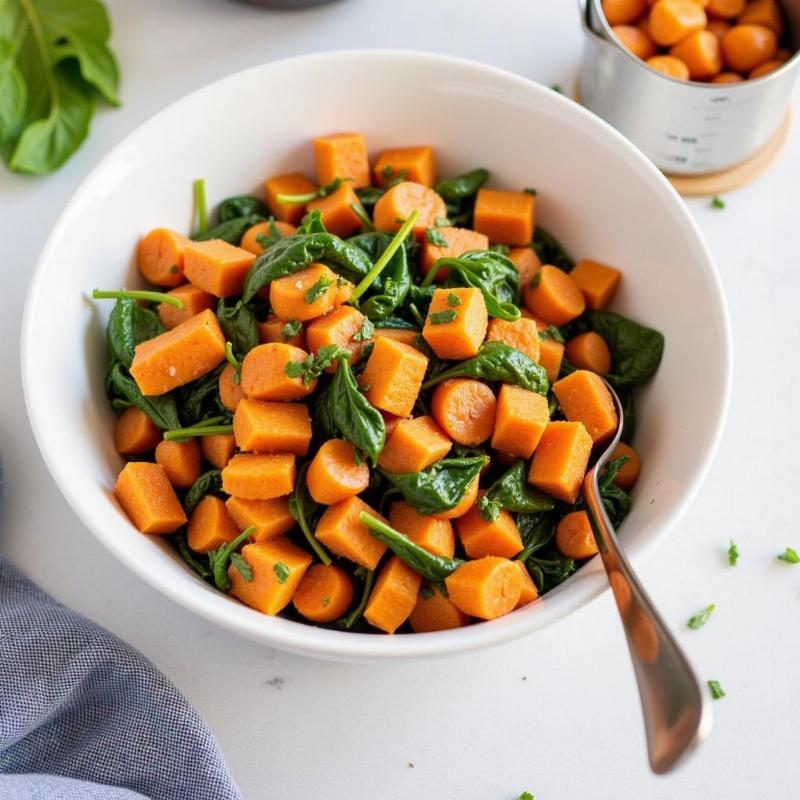Dealing with a dog’s skin allergies can be frustrating. Itchy skin, constant scratching, and recurring hot spots can make your furry friend miserable. While commercial hypoallergenic dog foods exist, many pet owners are turning to homemade dog food recipes for skin allergies as a way to control ingredients and potentially alleviate their dog’s discomfort. This approach allows you to tailor the diet to your dog’s specific needs and sensitivities.
Understanding Canine Skin Allergies
Before diving into homemade dog food recipes, it’s crucial to understand the underlying causes of canine skin allergies. The most common culprits are environmental allergens like pollen, dust mites, and mold. Food allergies can also trigger skin reactions, though they are less frequent. Common food allergens for dogs include beef, chicken, dairy, wheat, and soy. Identifying the specific allergen is key to effectively managing your dog’s allergies. Consult with your veterinarian for allergy testing and guidance. They can help pinpoint the triggers and recommend the best course of action, which may include dietary changes, medication, or other therapies.
Choosing Ingredients for Homemade Dog Food for Skin Allergies
Creating homemade dog food for skin allergies involves carefully selecting ingredients that are less likely to cause reactions. Novel proteins, like venison, rabbit, or fish (such as salmon or whitefish), are often good choices as they are less common in commercial dog foods. turkey and oatmeal dog food is another good option as turkey is also considered a novel protein. Carbohydrates like sweet potatoes, brown rice, and oats provide essential nutrients and are generally well-tolerated. Adding healthy fats, such as flaxseed oil or fish oil, can help improve skin and coat health.
Novel Proteins: The Foundation of Your Recipe
As mentioned, novel proteins are a cornerstone of hypoallergenic diets. Why? Because your dog hasn’t been exposed to them before, minimizing the risk of an allergic reaction. When choosing a protein, consider your dog’s preferences and any potential sensitivities. While salmon is a popular choice, some dogs may be allergic to fish.
Creating Balanced Homemade Dog Food Recipes
It’s essential to ensure your homemade dog food is nutritionally balanced. This means it must provide the right proportions of protein, carbohydrates, fats, vitamins, and minerals for your dog’s age, size, and activity level. Consult with a veterinary nutritionist to create a recipe that meets your dog’s specific needs. They can help you determine the correct portion sizes and ensure your dog isn’t missing any essential nutrients. Remember, improper nutrition can lead to health problems just as serious as allergies. best dog food for boston terrier can provide further insights into breed-specific nutritional needs.
Example Recipe: Salmon and Sweet Potato Dog Food
- 1 lb cooked salmon fillet, deboned and flaked
- 2 cups cooked sweet potato, mashed
- 1 cup cooked brown rice
- 1/2 cup chopped spinach
- 1 tablespoon flaxseed oil
Combine all ingredients and mix well. This recipe is a starting point and should be adjusted based on your dog’s individual needs and veterinarian recommendations. Remember to introduce new foods gradually to avoid digestive upset.
 Salmon and Sweet Potato Dog Food for Dogs with Skin Allergies
Salmon and Sweet Potato Dog Food for Dogs with Skin Allergies
Transitioning to Homemade Dog Food
Switching your dog to a new diet should be a gradual process. Start by mixing a small amount of the homemade food with their current food. Slowly increase the proportion of homemade food over several days to a week, allowing your dog’s digestive system to adjust. Monitor your dog closely for any signs of allergic reactions or digestive issues, such as vomiting, diarrhea, or changes in stool consistency. can dogs have potato bread explores another common food question, highlighting the importance of careful dietary choices.
Conclusion
Homemade dog food recipes for skin allergies can be a valuable tool in managing your dog’s condition. By selecting novel proteins, healthy carbohydrates, and beneficial fats, you can create a diet tailored to your dog’s individual needs. Remember to consult with your veterinarian and a veterinary nutritionist for guidance on creating a balanced and nutritious diet that supports your dog’s overall health and helps alleviate their skin allergy symptoms. what are skinless hot dogs might interest you if you are looking for more safe food options for your dog.
FAQ
- Can I add supplements to my homemade dog food? Yes, but always consult with your veterinarian before adding any supplements to ensure they are appropriate for your dog’s needs and won’t interfere with any medications.
- How should I store homemade dog food? Store leftover homemade dog food in airtight containers in the refrigerator for up to 3 days. You can also freeze it for longer storage.
- Is it expensive to make homemade dog food? The cost can vary depending on the ingredients you choose. freeze dried pumpkin for dogs offers affordable options for adding fiber and nutrients to your dog’s diet.
- What if my dog doesn’t like the homemade food? Experiment with different novel proteins and vegetables to find a combination your dog enjoys.
- How do I know if the homemade food is helping my dog’s allergies? Monitor your dog for improvements in their skin condition, such as reduced itching, scratching, and inflammation. Consult with your veterinarian to track progress.
- Can puppies eat homemade dog food for skin allergies? Puppies have different nutritional needs than adult dogs. Consult with your veterinarian or a veterinary nutritionist for a puppy-specific recipe.
- What are some other signs of food allergies in dogs besides skin issues? Other signs can include gastrointestinal upset, such as vomiting and diarrhea, ear infections, and excessive licking of paws.
Beautdogs.us is your premier resource for all things dog-related in the US. We provide expert advice on dog breeds, care, and products. Whether you’re a new dog owner or a seasoned pro, Beautdogs.us is your trusted source for comprehensive and engaging information on canine companionship. Contact us at [email protected] or call us at +1 501-555-7529 for personalized support.